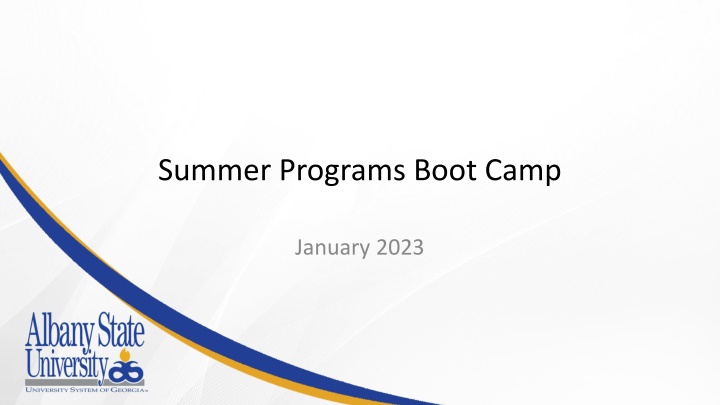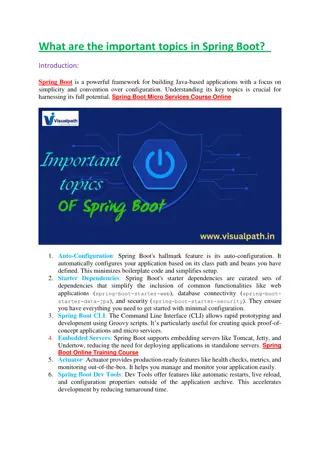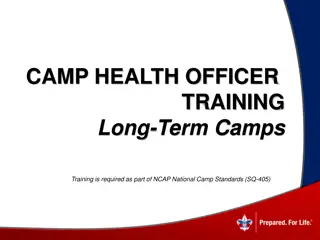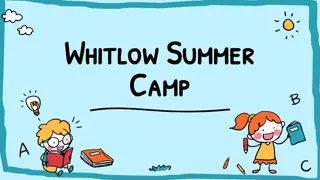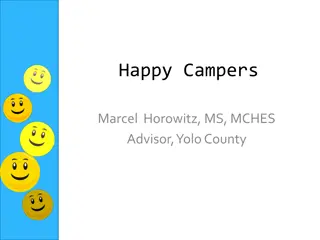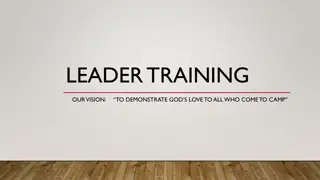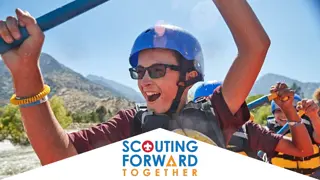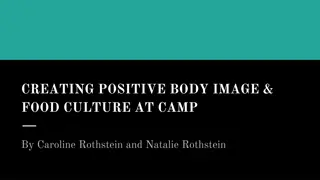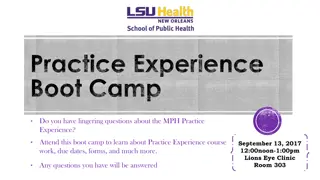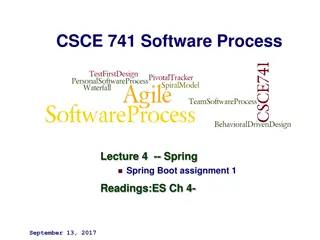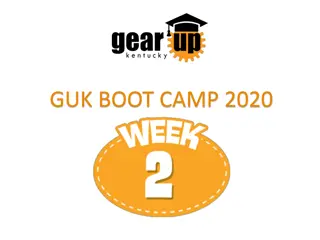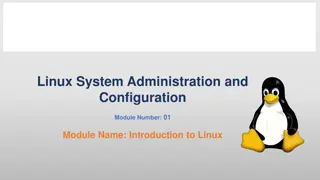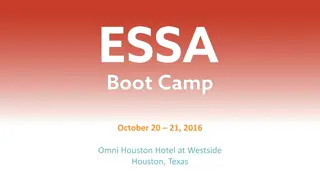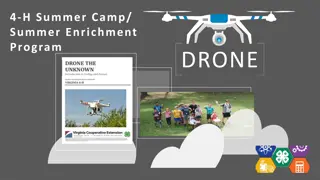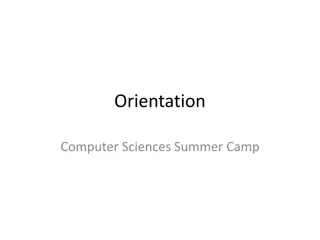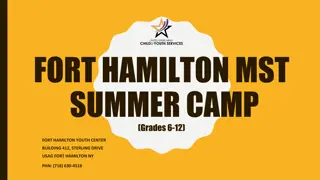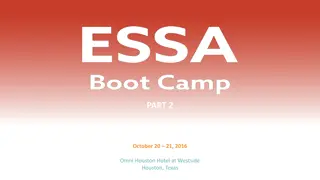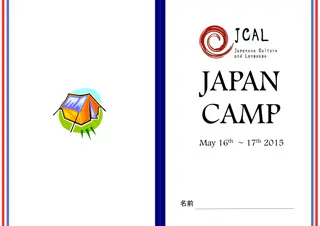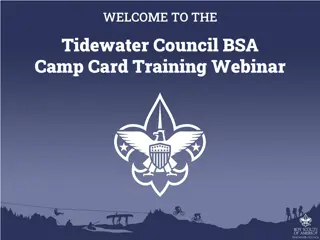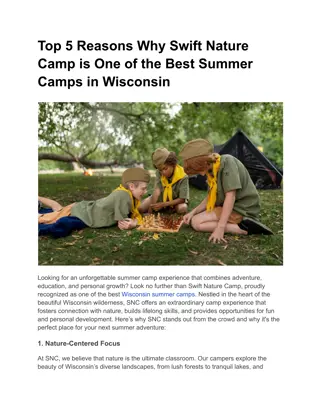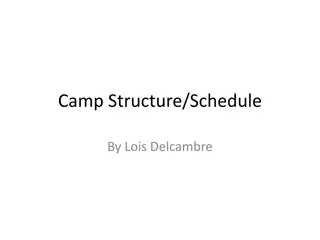Summer Programs Boot Camp
Enrichment Program registration and approval process, regulatory framework, Program Director roles and responsibilities, funding protocols, hiring protocols for employees, legal framework impact on programs, Program Director responsibilities, timelines and due dates, protection of Non-Student Minors policies and procedures.
Download Presentation

Please find below an Image/Link to download the presentation.
The content on the website is provided AS IS for your information and personal use only. It may not be sold, licensed, or shared on other websites without obtaining consent from the author.If you encounter any issues during the download, it is possible that the publisher has removed the file from their server.
You are allowed to download the files provided on this website for personal or commercial use, subject to the condition that they are used lawfully. All files are the property of their respective owners.
The content on the website is provided AS IS for your information and personal use only. It may not be sold, licensed, or shared on other websites without obtaining consent from the author.
E N D
Presentation Transcript
Summer Programs Boot Camp January 2023
Housekeeping One conversation at a time Ask your questions! There are no silly questions or ideas
Objectives Explain the Enrichment Program registration and approval process Outline the Enrichment Program regulatory framework (Non- student Minor Policy, Fair Labor Standards Act, etc.) Define Program Director roles and responsibilities for Enrichment Programs Discuss funding protocols for Enrichment Programs (Title III, Board of Regents, etc.) Review hiring and approving time for Enrichment Program employees
Legal Framework Enrichment Programs are impacted by many policies, rules, and laws: Federal: Fair Labor Standards Act, Department of Education, Internal Revenue Service State: Department of Labor, Board of Regents University: Non-student Minors
Program Director Responsibilities Register each program at Albany State University with Auxiliary Services Adhere to all applicable regulations Provide a safe environment for participants and workers Collect, monitor, and provide assessment data Supervise program workers Approve program workers time worked in OneUSG Connect Manage program budget(s)
Timelines & Due Dates Action Item Due Date Register to conduct an Enrichment program on campus Currently No later than 10 working days prior to the first day of program Inform Budgets of funding source(s) No later than 10 working days prior to the first day of program Complete the hiring process for all program workers Submit to be processed Purchase Requisitions to Purchasing No later than 10 working days prior to the first day of program Prior to workers (Paid and Volunteer) begin work- As notified by Non- Student Minors Office Complete all mandatory training Submit assessment information Within 10 working days after event conclusion
Protection of Non-Student Minors Policies and Procedures for Programs Serving Minors
Purpose of the Protection of Non-Student Minors Policy As set forth by the Board of Regents of the University System of Georgia in the Board of Regents Policy manual Section 6.9, University System of Georgia (USG) institutions periodically conduct, sponsor, or host programs designed to serve minors who are not enrolled as students, including but not limited to camps, clinics, after school programs, and activities. Employees and volunteers associated with these programs who are reasonably anticipated to have direct contact or interaction with minor program participants must be appropriately pre-screened and trained. Institution presidents shall establish institution-level procedures to implement this policy and related directives from the USG. The Albany State University Policy for the Protection of Non-Student Minors may be found on the ASU Legal Affairs web page under Legal Affairs, University Policies. https://www.asurams.edu/legal-affairs/protection-of-non-student-minors.php The purpose of this policy is to assure that appropriate policies and procedures for the supervision of non-student minors that visit Albany State University (ASU) are identified and to set out the appropriate procedures to be followed by both ASU and non ASU entities in order to host events which include non-student minors on property owned by or leased by ASU or in any ASU sponsored program at other locations. This policy became effective for programs starting on or after May 1, 2017.
What is the definition of a minor as it relates to this policy and what types of activities does the policy cover? instructional program involving key use of facilities, i.e., recreational, academic classrooms, student center and any physical educational facility, indoors or outdoors. Programs such as athletic camps, after school programs, science camps, music and other enrichment programs. The program may be a residential or overnight camp or a commuter day camp. Any child under the age of 18 who is not currently enrolled at ASU, but who is on the ASU campus for any type of third party rentals of facilities to outside organizations to host programs/events on campus. Summer camps, academic enrichment programs, visual and performing arts groups where participants are minors, Who is required to be in compliance? the University is responsible for payment of all expenditures related to that activity. All events sponsored by ASU, meaning that any program, camp or event in which the funds for the operation of the program, whether by grant, registration fees, sponsors, etc. are deposited into the University account and for which documents to gather information as are ASU sponsored activities. Third party activities are those programs that are operated by an individual or group who are not, for purposes of the camp operation, employed by the University, i.e., an employee has a personal camp and said employee is responsible for all operations of the camp and assumes liability for all camp activities. Third party groups are required to comply with the basic policy and procedure but are not mandated to use the
Are there any exemptions to this policy? Private or personal events such as weddings, birthday parties, family reunions. Services provided by the institution s health clinic. Students participating in intercollegiate activities, such as athletics and visual and performing arts. Programs/events open to the public for which tickets are sold for attending. Why must the camps be registered and follow through with the process? minors. All persons interested in hosting a program that includes non-student minors on property owned by or leased by ASU or in an ASU-sponsored program at other locations, must complete the program registration form and follow these policies outlined in the Summer Camp/Program Manual for the Protection of Non-Student Minors. ASU is responsible for establishing and maintaining a registry of all authorized programs that host non-student The University must ensure that special care is taken to provide the appropriate levels of care and supervision for summer camps or activities is commensurate with the policies outlined in the Summer Camp Manual. The Board of Regents mandates that the registry and appropriate document be on file in the Compliance Office for the Protection of Non-Student Minors. Directors/sponsors will be held accountable for the training for all paid and volunteer staff of the activity.
How do I register my camp/activity? volunteers. When compliance in all areas has been met, a notice will be electronically sent to the Events Office who will then release notification to the requestor that the camp has met all mandated requirements and you may proceed with the activity. Click on the following like to go to the Smart sheet registration form. https://app.smartsheet.com/b/form/1a04581dade44abbb8701298f83b7819 Youth Program Serving Non-Students Minors, Request for Approval ASU Sponsored or Third Party Camps Administered by an ASU Employee Complete all sections and submit. Document will be routed electronically through the approval process. 1. Initial approval from the Cabinet Level or Grant Officer. 2. To HR to ensure that all personnel requirements are completed for all employees and 3. To Budgets to ensure that the request is within the approved budget parameters. 4. To the Title IX Office to ensure that all employees have completed the Title IX training. 5. To the Events Office to ensure that all Protection of Non-Student Minors training has been completed. If it is found that a camp proceeds without having registered and complying with all requirements, the camp will be given a cease and desist order and not be able to proceed. It will be the responsibility of the director to notify the participants that the activity has been cancelled.
What are the Universitys expectations of me as a camp director/sponsor? confirmations have been received. Priority given to ASU sponsored camps. That a reasonably safe environment is provided for participants, i.e., qualified counselors are employed, background screenings have been done, ensure that those driving to the event have a valid license to operate the type of vehicle used and that it is registered to be on campus. Ensure that parents are aware of the type of activities in which the child will participate to include known risks, provide safety instructions. The director/sponsor shall be responsible for ensuring that all paid and volunteer staff are trained relative to the Protection of Non-Student Minors Policies either by attending training session provided by the Events Office or using the Summer Camp Manual as a guide and personally providing the training. That the ratio of camper to chaperone is compliant with those set forth by the American Camp Association. Standards for residential camps are: One staff member for every five campers ages 4 and 5 One staff member for every six campers ages 6 to 8 One staff member for every eight campers ages 9 to 14 One staff member for every ten campers ages 15-17 Standards for day camps are: One staff member for every six campers ages 4 and 5 One staff member for every eight campers ages 6 to 8 One staff member for every ten campers ages 9 to 14 One staff member for every twelve campers ages 15 to 17. That all annual training requirements for paid and volunteer staff have taken place and documentation is on file to that effect. That the appropriate requests for use of and reservation of facilities has been entered into 25Live and that
What are the essential requirements for ensuring the camp/activity is compliant? There is a purpose and mission of the camp. All ASU Protection of Non-Student Minors Policy Training is completed. Mandatory Report and Title IX training is completed. A positive, respectful and encouraging environment is maintained during the program. There must be a planned schedule of activities. There is a division of assignments and responsibilities of staff. A plan to prevent bullying, hazing or sexual harassment is in place. There is a written cell phone and electronics policy. Social media and privacy rules are in place. Constant supervision is maintained from drop off to pick up. There is a process for reporting and responding to incidents of misconduct. A participant orientation must be held. Items to include are program schedule, rules and regulations, safety plans and procedures, expectations as to appropriate conduct and how to report problems or concerns. At the end of the orientation participants must sign and agree to abide by the Participant s Code of Conduct. Copy kept on file. Background checks are completed by the ASU Human Resource Department. If required, a DECAL (Georgia Department of Early Care and Learning, exemption request has been filed and granted. A copy of the exemption must be sent to the Compliance Office and posted. Note: For all ASU Sponsored programs, the Events Office has an exemption certificate on file.
A employee/volunteer orientation is held prior to the start of the program to include detecting and reporting suspected abuse and how to resolve conflicts between participants. At the end of the orientation, each staff member, paid or volunteer, must agree to abide by and sign the Employee Code of Conduct. Copy kept on file. Emergency procedures to include, fire, inclement weather, accident, active shooter, etc. are written, discussed at orientation and available for review by parents if requested. Safety and security protocols are in place that cover risks associated with specific activities; taking and retaking attendance and maintaining an attendance log; lost child protocol; appropriate camp-to-counselor ratios; guest visitation rules where permitted, check in and check out procedures, and prescription and other medication procedures. The Emergency Locater document, as provided in the Camp Manual, is completed and sent to the ASUPD. If this is a residential camp that all Housing forms have been completed and sent to the EVENTS Office for processing. The Events staff will serve as the liaison between the requestor and housing. Inform the parents/guardians that Albany State University does not provide accident or medical insurance for camp participants. Inform parents that this is activity is not a legally licensed child care facility. This notice must be on the registration form and acknowledged by the parent/guardian when registering the student for the program.
Arrange for all catering/food services required through the dining contractor on campus at the time of the camp. Ensure that the drop-off and pick-up area is safe and that there is a well defined process as to where, how, when and who may pick up or drop off participants. Complete the Post Event Summary Report and submit it to the Events Office, Camp Manual, Appendix 11. Use the Non-Student Minors Program Checklist to keep on track. Records retention of all forms, documents, etc. must be housed in a department file accessible from year to year regardless of whether the previous direct is currently employed at the University. All documents relative to minors on campus must be retained for 10 years or five (5) years after the participant reaches 18 years of age. Important take aways! All training must be completed and documents on file prior to the start of any camp, program or event where minors attend. Directors will be held accountable for ensuring that all documents and training are completed and evidence of such is on file. The Compliance Office will be performing internal audits of each program to ensure that what we say we are doing is actually being done! Use the check lists to stay on track. Complete the forms and submit them in a timely manner. Watch for an USG Audit fall 2023. Inform all staff that there is NO One-on-One contact with participants. Always work in groups of two or more. Communicate via social media posts and emails directed to all parents/participants. No individual phone calls or emails between an employee and a camper.
What are my resources to ensure that as a director I am training staff appropriately? The Auxiliary Services Events Office is the Compliance Office for Albany State University. Any questions may be directed to that office Martha Snow, 229-500-2884; martha.snow@asurams.edu. A Summer Camp/Program Manual for the Protection of Non-Student Minors may be found on the Auxiliary Services web page https://www.asurams.edu/fiscal-affairs/auxiliary-services/events/index.php. Templates for all approved forms to be used to conduct a camp/activity at ASU are included in the Summer Camp Manual and may be duplicated as needed. The Albany State University Employee Handbook, the Human Resources Department, Budget Office, affiliated grants office and Title IX office. Board of Regents Policy 6.9 Programs Serving Minors USG Programs Serving Minors Resource Page USG Background Check Requirements State Licensing Requirements National Sex Offender Registry Who should I contact if additional information is needed? Martha Snow Auxiliary Services Compliance Office 229-500-2884 martha.snow@asurams.edu Ms. Shanice Howard Events Coordinator Auxiliary Services 200-500-2885 shanice.howard@asurams.edu
Title III Summer Programs ENGAGING THE COMMUNITY 2023
PURPOSE: To provide outreach to local agencies, local school systems, and community-based organizations to support ASU Strategic Plan and the following initiatives: K-12 educational/enrichment programs United Way Service Learning Healthcare service-learning Literacy service-learning Career and professional development for students, Other social and educational discipline-focus learning opportunities
Application Process Submit a mini-proposal by February 3, 2023 using the following Smartsheet link: https://app.smartsheet.com/b/publish?EQBCT=f38e7f21007b41ceb12173a3cea0c41a. Register for the Summer Program using the following link: here. The components of proposal includes: Identification of the project director and co-projector. Total budget amount requested. Identify what ASU strategic goals are supported by the project. Identify what ASU initiative will be supported by the project. Provide a brief summary of the project.
Next steps after mini-proposal submission: Review and approval of proposals. Once approved: The activity directors/co-activity directors of the approved projects will be contacted to complete a full-proposal that includes objectives, an implementation plan and detailed budget. The activity directors will participate and complete BOR required training for Summer Programs involving minors. The activity directors/co-activity directors/administrative assistant will be required to attend a Title III Orientation meeting. Implement plan immediately.
Monitor Your Project Ensure the safety of the participants and provide quality service as required by the BOR/Institutional Policy. Monitor and approve the work of your employees. Ensure that you can verify work hours and submit time to HR for appropriate pay. Ensure that the payment of hours worked is within the budget. Keep track of the status of your orders and requests for supplies and materials. Keep track of the status of your requests for consultants for payment. Make sure that any consultant that has direct contact with minors also adhere to BOR/Institutional policy for summer camps Ensure that you have required coverage for minors from the beginning to the end of summer camp each day Ensure that all employees of the camp is knowledgeable of the emergency plan and is capable of implementing the plan.
Monitor Your Project Periodically review your project to determine if you are on track with the approved objectives Evaluate the effectiveness of the project with surveys. Make sure you have contact Institutional Effectiveness to develop a survey tool prior to the camp dates. Evaluate and determine if adjustments are needed such as the number or participants or the number of employees required for the program. Evaluate and determine if you need more resources to complete the project CONTACT THE OFFICE OF TITLE III BEFORE ADJUSTING ANY PROGRAM ITEMS OR ADDING ANY ADDITIONAL EXPENSE FOR APPROVAL.
Assess Your Project All Title III Sponsored Summer Camp Projects are required to submit a final report within 30 days after last date of the program. A reporting format will be provided. Provide a detailed report demonstrating the outcomes of your project objectives Include milestones, success stories, challenges, future opportunities, etc. in your report. Include data to support your outcomes
Summer Programs Sponsored by Federal Funding The Office of Research and Sponsored Programs (ORSP) must be informed if you have received sponsored funding to support your summer program (except for Title III funded Projects) ORSP routes the new grant information to Budgets for Account set-up Pre-plan for the summer program, several months in advance (in the Spring Semester or earlier) so that hiring paperwork and ordering of necessary supplies are completed when your program begins Plan accordingly for outgoing subrecipient agreements and contracted services agreements
Summer Programs Sponsored by Federal Funding Make a habit of following up on paperwork, to be informed of status and to make adjustments as needed for the timely and successful implementation of your program If in-kind support was approved for your program, meet with the appropriate institutional personnel to discuss Make sure the project has IRB approval if the summer program activities will be part of a research study and/or be disseminated at conferences or through publications Keep clear records of summer project activities for required reports to the sponsoring organization
Summer Programs Summer Programs
Approved Sponsored Awards Upon receipt of new awards, notification/information of sponsored (grants) funding should be routed to ORSP (exception Title III awards) for processing. Once the Office of Budgets and Contracts (OBC) receives award notification, an account number is requested/set up for programming. Spending: Request for purchases should be sent to OBC for approval. Travel requests should be submitted/processed utilizing OneUSG travel module (online portal). Additional/supplemental pay compensation should be processed utilizing the proper compensation forms with authorized signatures Manage your budget: Ensure the availability of funds prior to processing/submitting requests for expenditures. Business Process and helpful information to assist in managing your budgets are available utilizing the following link: http://www.asurams.edu/fiscal-affairs/budgets-contracts/index.php
Contacts Sharon Smith sharon.smith@asurams.edu 229-500-3057 Corlissa Polite, Budgets and Contracts corlissa.polite@asurams.edu 229-500-3025
What We Will Cover How to Hire Summer Program Workers Process Funding Source (i.e. FWS or SA) Documentation Employee Classifications Who should be a classified as a contractor and why
Hiring Summer Program Workers (New Hires, Rehires, & Volunteers) Receiving Payment Must complete Student Authorization is sent from Student Employment if Federal Work- Study (FWS) HRAF if Student Assistant (SA) Hiring packet is created through Equifax Compliance Center ASU background check I9 Documents are Submitted Required Minors Training Not Receiving Payment Must complete: Volunteer Application Form , An ASU background check, Required Minors Training
Rehired Retirees If the individual retired through Teachers Retirement System (TRS), then the university and the individual will have to apply to TRS seeking permission for the person to work prior to the beginning of the program If the individual is a regular rehire, an HRAF or Student Authorization form is completed and submitted to the hiring manager approval and signature. HRAFs are sent to Budgets and Budgets sends to HR.
Volunteers Individuals who have registered with HR, completed the required Minors Training w/ Auxiliary Services, and have a satisfactory university background check are eligible to volunteer with university summer programs. Individuals who are currently employed by the university must take annual leave in order to volunteer with summer programs.
Student Workers Students can be paid from summer programs on an hourly rate that equates to budgeted allocations. These wages are subject to taxation. Students must be employed by the university and paid through the regular payroll process when working with summer programs for pay. Students who are not enrolled in summer classes can work for summer programs as long as they are classified as Casual Labor and not Student Assistants
Federal Work Study Students Assigned through Student Employment/ Financial Aid Contact Ms. Snead in Student Employment to learn if there are Federal Work Study (FWS) jobs available during summer months FWS workers must be treated and paid as any other worker who is performing the same or similar work
Hiring ASU Faculty for Summer Programs Ten-month faculty members can be paid for working with summer programs Twelve-month faculty members can be paid for working with summer programs if the work is outside of the scope of the employees job duties and the employee takes leave during the time services are being provided to program activities
Hiring Current ASU Staff for Summer Programs Hourly employees, such as Administrative Assistants, could be paid for working with a summer program through additional hours worked. The additional work time must be recorded and approved in the payroll system. Monthly staff members can be paid for working with summer programs if the work is outside of the scope of the employees job duties and the employee takes leave during the time services are being provided to program activities
USG Background Check Policy It shall be a condition of employment with any institution of the University System of Georgia to submit to a background investigation. Offers of employment shall be conditional pending the result of the background investigation, which shall include, at a minimum, the following: A state and federal criminal history check covering a minimum of seven (7) years. Institutions may require state and federal criminal history check covering more than the minimum of seven (7) years for specified positions of trust; A nationwide sex offender search; A social security number check; For all professional, faculty and academic positions, an academic credentials check; and For all positions with access to or responsibility for money and/or a Purchase Card, a credit check.
USG Background Check Policy A background investigation shall also be performed on: Any existing employee being transferred, reassigned, reclassified or promoted to a position of trust unless a background investigation conforming to this procedure has been performed within the past year. All part-time, student or temporary employees and volunteers with primary responsibilities involving the direct interaction or care of children under the age of 18. Any existing employee that is transferred, reassigned, reclassified or promoted into a position requiring a Purchase Card, when they have not been assigned a Purchase Card previously, must submit to a credit check. Existing cardholders are subject to a background check before next renewal of card.
Paying Workers as Contractors Must meet regulatory guidelines Internal Revenue Service Department of Labor Most workers cannot be classified as Contractors per regulatory guidelines Misclassifying workers as Contractors could have serious consequences
Ramifications for Misclassifications Tax consequences Employee benefit obligations Workers compensation Unemployment compensation Wage and hour liability Vicarious liability
What is an Independent Contractor Independent Contractor: An individual who performs personal services for the Institution where the Institution has the right to specify the result to be accomplished by the work, but not the means and methods by which the result is to be accomplished.
What is an Employee Employee: An individual who performs personal services for the Institution where the Institution has the right to control and direct the individual who performs the services, not only as to the result to be accomplished, but also as to the details and means by which that result is to be accomplished. It is not necessary that the Institution actually direct or control the manner in which the services are performed; it is sufficient to establish an employee-employer relationship that the Institution has the right to do so.
Employee vs Independent Contractor Employee Examples Independent Contractor Examples Contract-Classified Staff Credit or Noncredit Primary Course Instructors Faculty Hourly Employees Medical Residents Professional Staff Research Assistants Student Helpers Teaching Assistants Artists Consultants Guest Lecturers and Seminar Leaders (occasional service and not Primary Course Instructors) Lawyers Musicians Public Stenographers Veterinarians
Managers/Supervisors Managers are responsible for approving students time in OneUSG Connect All workers, including students, should be entering their own time into OneUSG Connect/timesheets No one, including students, should begin work until approved by Human Resources Hire date in job data is the first active day students can enter in time Any hours/days worked prior to their hire date cannot be processed List all Time Approvers on the HR Action Form Make sure you can view your student worker in team time
Managers/Supervisors How do I approve time for my employees https://www.youtube.com/watch?v=Xuc9-lTvcD0
